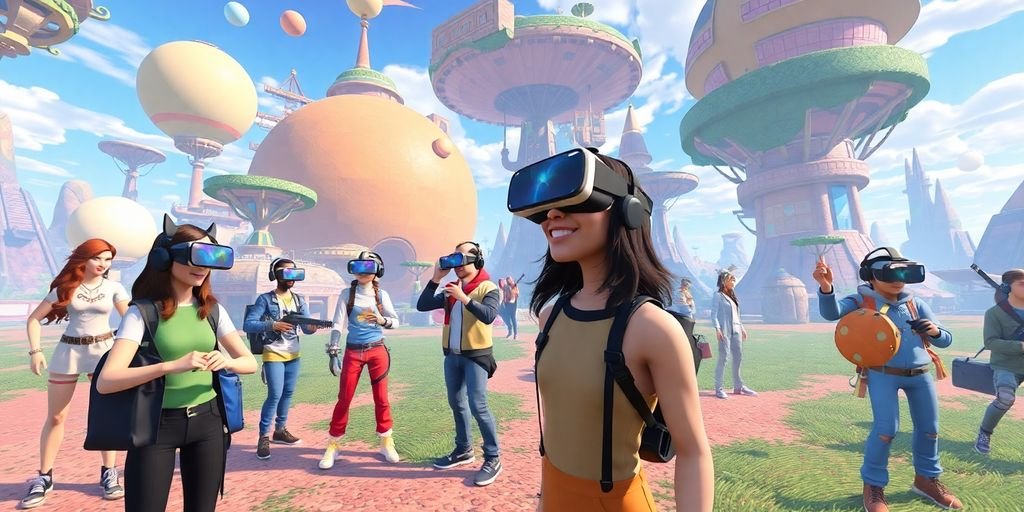The Metaverse is a growing virtual world where people can interact, play, and earn money. It offers a variety of opportunities for individuals to make money in the metaverse. From gaming and real estate to freelancing and hosting events, there are many ways to get involved and start earning. This article explores the different avenues available for making money in this exciting new digital landscape.
Key Takeaways
- Engage in play-to-earn games for easy earnings while having fun.
- Create and sell 3D accessories to enhance virtual experiences.
- Develop VR games that can attract users and generate revenue.
- Freelance in the metaverse to offer services and skills in demand.
- Host virtual events for profit through ticket sales and sponsorships.
Exploring Play-to-Earn Gaming Opportunities

Understanding Play-to-Earn Models
Play-to-earn (P2E) gaming is changing the way we think about games. In these games, players can earn real money, often in the form of cryptocurrency or NFTs, just by playing. This model allows gamers to turn their time and skills into actual income, making gaming more than just a hobby.
Popular Play-to-Earn Games
Some of the most popular play-to-earn games include:
- Axie Infinity: Players breed and battle creatures called Axies.
- The Sandbox: A virtual world where players can create, own, and monetize their gaming experiences.
- Decentraland: A 3D virtual world where users can buy land and create experiences.
Monetization Strategies in Gaming
There are several ways to make money in play-to-earn games:
- Winning Battles: Players can earn rewards by defeating opponents.
- Completing Quests: Many games offer rewards for completing specific tasks.
- Trading NFTs: Players can buy, sell, or trade in-game items for profit.
The rise of play-to-earn gaming is a revolutionary shift in the gaming landscape, allowing players to earn while they enjoy their favorite games.
| Game Name | Earnings Potential | Popularity Level |
|---|---|---|
| Axie Infinity | High | Very High |
| The Sandbox | Medium | High |
| Decentraland | Medium | Medium |
Designing and Selling 3D Accessories
Creating Virtual Wearables
Creating virtual accessories for avatars is a fun and profitable venture. Many users want to personalize their avatars with unique items. Here are some popular types of accessories you can design:
- Wearable gadgets (like glasses or hats)
- Outfits and costumes
- Special effects items (like wings or magical items)
Marketplaces for 3D Accessories
Once you create your designs, you can sell them on various online marketplaces. Some popular platforms include:
- Decentraland Marketplace
- Roblox
- OpenSea
These platforms allow you to reach a wide audience of potential buyers.
Tools for 3D Design in the Metaverse
To create your accessories, you’ll need the right tools. Here are some recommended software options:
- Blender – A free and powerful 3D modeling tool.
- Tinkercad – A beginner-friendly design tool.
- Unity – Great for more complex designs and game integration.
Designing 3D accessories can be a rewarding experience, allowing you to express creativity while earning money in the metaverse.
In summary, designing and selling 3D accessories is an exciting opportunity in the metaverse. With the right tools and platforms, you can turn your creative ideas into profitable products. Whether you’re creating unique wearables or exploring new design techniques, the possibilities are endless!
Developing and Monetizing VR Games
Creating and selling VR games can be a fun and profitable venture. Many people are eager to dive into this exciting field. Here’s how you can get started:
Game Development Platforms
- Unity: A popular choice for both beginners and experts.
- Unreal Engine: Known for its stunning graphics and powerful tools.
- Horizon Worlds: A user-friendly platform for creating VR experiences without needing advanced skills.
Storytelling in VR Games
Good storytelling is key to engaging players. Here are some tips:
- Create relatable characters that players can connect with.
- Build immersive worlds that draw players in.
- Use interactive elements to make the story feel alive.
Revenue Models for VR Games
There are several ways to earn money from your VR games:
- In-game purchases: Players can buy items or upgrades.
- Subscription models: Charge players a monthly fee for access to exclusive content.
- Sponsorships and ads: Partner with brands to include their products in your game.
The success of your VR game often depends on how well you understand your audience and their preferences.
By focusing on these areas, you can create engaging VR games that not only entertain but also generate income. Remember, monetization strategies in metaverse games are crucial for long-term success!
Freelancing in the Metaverse Economy
Freelancing in the metaverse is becoming a popular way to earn money. These systems are creating new income opportunities for gamers, mirroring the gig economy, where individuals can earn money on a freelance basis. Here are some key areas where freelancers can thrive:
Types of Freelance Jobs Available
- Virtual Event Planner: Organize and manage online events.
- Tour Guide: Help users explore virtual spaces.
- 3D Designer: Create virtual accessories and environments.
Skills Needed for Metaverse Freelancing
- Creativity: Ability to design engaging virtual experiences.
- Technical Skills: Knowledge of 3D modeling and programming.
- Communication: Strong skills to interact with clients and users.
Platforms for Finding Metaverse Gigs
- Freelancer.com: A general freelancing platform with metaverse projects.
- Upwork: Offers various freelance jobs, including in the metaverse.
- Fiverr: A marketplace for creative services, including virtual design.
The metaverse offers a unique space for freelancers to showcase their skills and connect with clients globally. As this digital world grows, so do the opportunities for those willing to adapt and innovate.
Hosting Virtual Events and Experiences
In the metaverse, hosting virtual events can completely change how we experience gatherings. With the ability to create immersive environments, event planners can engage audiences like never before. Here are some key aspects to consider:
Planning and Organizing Virtual Events
- Define Your Purpose: Determine the goal of your event, whether it’s a concert, conference, or social gathering.
- Choose the Right Platform: Select a metaverse platform that suits your event’s needs, such as VRChat or AltspaceVR.
- Promote Your Event: Use social media and other channels to attract attendees.
Ticketing and Sponsorship Opportunities
- Paid Tickets: Charge attendees for access to exclusive events, like concerts or workshops.
- Sponsorships: Partner with brands to sponsor your event, providing them visibility in exchange for financial support.
- Merchandise Sales: Sell event-related merchandise to enhance revenue.
Popular Platforms for Virtual Events
| Platform | Features | Best For |
|---|---|---|
| VRChat | Customizable avatars, social interaction | Social events |
| AltspaceVR | Live streaming, audience engagement | Conferences and talks |
| Gather | Interactive spaces, video chat | Networking events |
The metaverse allows you to revolutionize your events with metaverse technology, creating unique experiences that go beyond traditional formats.
By leveraging these opportunities, you can create memorable virtual events that engage and entertain participants, while also generating income.
Investing in Virtual Real Estate
Understanding Virtual Real Estate
Investing in virtual real estate is becoming a popular way to earn money in the metaverse. This type of investment involves buying and selling digital land. While it’s not the same as owning physical land, many people see value in these virtual properties. In the not-so-distant future, owning property in the metaverse could become as normal as buying a house in the physical world.
Buying and Selling Digital Properties
Here are some key points to consider when investing in virtual real estate:
- Location matters: Just like in the real world, the value of virtual land can depend on its location. High-traffic areas can be more valuable.
- Market trends: Keep an eye on the market. Prices can change quickly, and understanding trends can help you make better decisions.
- Investment potential: Some investors have made significant profits by buying land and selling it later at a higher price.
Risks and Rewards of Virtual Real Estate
Investing in virtual real estate comes with both risks and rewards:
- Volatility: The market can be unpredictable, and prices may drop suddenly.
- Legal issues: There may be legal considerations when buying and selling virtual properties.
- Long-term value: While some properties may increase in value, others may not, so it’s important to do your research before investing.
Investing in virtual real estate can be a lucrative opportunity, but it’s essential to understand the risks involved. Make informed decisions to maximize your chances of success.
Becoming a Metaverse Marketer

Digital Marketing in Virtual Worlds
The metaverse offers exceptional opportunities for marketers to engage consumers in a 3D digital experience using VR and AR. As a metaverse marketer, you can create immersive campaigns that captivate audiences in ways traditional marketing cannot.
Building a Metaverse Marketing Agency
Starting your own marketing agency in the metaverse can be a rewarding venture. Here are some steps to consider:
- Identify your niche: Focus on specific industries or types of products.
- Develop a portfolio: Showcase your previous work and successful campaigns.
- Network with brands: Build relationships with companies looking to enter the metaverse.
Case Studies of Successful Metaverse Campaigns
Several brands have successfully launched campaigns in the metaverse. For example:
- Nike created a virtual store in Roblox, allowing users to customize and purchase digital sneakers.
- Gucci released a digital handbag in Roblox, which sold for $6 but resold for over $4,000.
- Adidas hosted a virtual concert that attracted thousands of attendees, showcasing their products in an engaging way.
The metaverse is still in its early stages, providing a unique chance for marketers to experiment and innovate. By leveraging the immersive nature of virtual worlds, you can create memorable experiences that resonate with consumers.
Trading and Creating 3D NFTs
Basics of 3D NFTs
3D NFTs, or non-fungible tokens, are unique digital assets that exist in the metaverse. These digital assets connect and enhance the virtual world, transforming how you own and interact online. They can represent anything from art to virtual real estate, and their value can fluctuate based on demand.
Platforms for NFT Trading
There are several platforms where you can trade 3D NFTs. Here are some popular ones:
- OpenSea: A leading marketplace for various NFTs.
- Rarible: A community-driven platform for creating and trading NFTs.
- Foundation: A platform focused on digital art and creative projects.
Creating Value with 3D NFTs
To create value with 3D NFTs, consider the following steps:
- Design Unique Assets: Use creativity to make something special.
- Mint Your NFT: Turn your digital creation into an NFT on a platform.
- List for Sale: Put your NFT on a marketplace for others to buy.
In the metaverse, trading and creating 3D NFTs can be a rewarding venture, but it requires understanding the market and being aware of potential risks.
Educational Opportunities in the Metaverse
Teaching and Coaching in Virtual Worlds
The metaverse offers a unique chance for educators to teach in immersive environments. This can make learning more engaging and effective. Here are some ways educators can utilize the metaverse:
- Virtual classrooms: Create interactive lessons that allow students to explore concepts in 3D.
- Coaching: Offer personalized tutoring sessions in a virtual setting.
- Workshops: Host skill-building workshops that can reach a global audience.
Developing Educational Content
Creating educational content for the metaverse can be a rewarding venture. Here are some ideas:
- Interactive lessons: Design lessons that allow students to interact with the material.
- 3D simulations: Use 3D models to explain complex topics, like physics or biology.
- Gamified learning: Incorporate game elements to make learning fun and engaging.
Platforms for Metaverse Education
Several platforms are emerging to support education in the metaverse. Some popular ones include:
- AltspaceVR: A social VR platform that hosts educational events.
- Engage: A platform designed for creating and sharing educational content.
- Mozilla Hubs: A web-based VR platform that allows for easy access to virtual classrooms.
The metaverse is transforming education by providing new ways to learn and teach. As technology advances, the potential for immersive learning experiences will only grow.
In conclusion, the metaverse is opening up exciting educational opportunities for both teachers and students. By leveraging these tools, educators can create engaging and effective learning experiences that were previously unimaginable.
Tourism and Travel Services in the Metaverse
In the metaverse, the travel industry is evolving, offering exciting opportunities for users to explore and experience new places without leaving their homes. This digital landscape allows for immersive experiences that can enhance pre-trip planning, in-trip activities, and post-trip reflections.
Virtual Tour Guide Opportunities
- Become a virtual tour guide: Help users navigate through historical sites or popular destinations in the metaverse.
- Create engaging experiences: Use your knowledge to provide insights and stories about the places being visited.
- Interact with visitors: Offer personalized tours that cater to the interests of your audience.
Creating Immersive Travel Experiences
- Design 3D models: Recreate famous landmarks or natural wonders for users to explore.
- Host virtual travel events: Organize experiences that allow users to participate in cultural events or festivals.
- Collaborate with travel brands: Partner with companies to promote their services in the metaverse.
Monetizing Virtual Tourism
- Sell tickets for virtual tours: Charge users for access to exclusive experiences.
- Offer sponsorships: Work with brands to feature their products or services during your tours.
- Create a subscription model: Provide ongoing access to new experiences for a monthly fee.
The metaverse can significantly enhance the travel experience, allowing users to explore places they may never visit in real life.
By leveraging these opportunities, individuals can tap into the growing demand for virtual tourism and create unique experiences that resonate with users.
Becoming a Metaverse Architect
Designing virtual spaces is an exciting opportunity in the metaverse. Creating unique and functional virtual buildings can be a rewarding career. If you have skills in 3D modeling and programming, you can build a portfolio and offer your services as a freelancer.
Designing Virtual Structures
To become a successful metaverse architect, you should focus on:
- Learning 3D modeling software: Familiarize yourself with tools like Blender or SketchUp.
- Understanding user experience: Know how users interact with virtual spaces.
- Staying updated on trends: Follow the latest designs and technologies in the metaverse.
Tools for Metaverse Architecture
Here are some essential tools for designing in the metaverse:
- Blender: A free and open-source 3D creation suite.
- Unity: A powerful game development platform that supports VR.
- SketchUp: Great for creating 3D models quickly.
Building a Portfolio as a Metaverse Architect
To attract clients, you need a strong portfolio. Consider these steps:
- Showcase your best work: Include a variety of projects.
- Highlight your skills: Make sure to mention your technical abilities.
- Network with others: Connect with other architects and potential clients in the metaverse.
In the metaverse, a well-known metaverse architect, working as a freelancer, can ask for around $1,000 to $4,000 for the most straightforward build. This shows the potential for earning in this field!
Risks and Challenges of Making Money in the Metaverse
Understanding Market Volatility
The metaverse is a new and exciting space, but it comes with significant risks. The value of digital assets can change quickly, making it hard to predict profits. Here are some key points to consider:
- Market fluctuations can lead to sudden losses.
- Many investments lack proper oversight, increasing the risk of scams.
- Investing more than you can afford to lose is a common mistake.
Legal and Ethical Considerations
As the metaverse grows, so do the legal challenges. Users must be aware of the following:
- Intellectual property issues can arise when creating or selling digital goods.
- Privacy concerns are important, as personal data may be at risk.
- Regulations are still developing, which can lead to uncertainty.
Strategies for Risk Management
To navigate the metaverse safely, consider these strategies:
- Diversify your investments to spread risk.
- Stay informed about market trends and changes.
- Use reputable platforms for trading and transactions.
The metaverse offers exciting opportunities for earning income, but it also comes with its share of challenges and risks. Understanding these factors is crucial for success.
Conclusion
In conclusion, the Metaverse presents a wide range of ways to earn money, from simple activities to more complex ventures. Whether you enjoy playing games, designing virtual items, or even hosting events, there are opportunities for everyone. As the Metaverse continues to grow, so will the chances for individuals to make a profit. However, it’s important to remember that, like any investment, there are risks involved. By staying informed and being cautious, you can explore this exciting new world and find your own path to success.
Frequently Asked Questions
What is the Metaverse?
The Metaverse is a virtual world where people can interact, play games, shop, and even work. It combines elements like virtual reality and digital assets.
Can I really make money in the Metaverse?
Yes, you can earn money in the Metaverse by selling virtual real estate, creating digital products, or hosting events.
What are Play-to-Earn games?
Play-to-Earn games allow players to earn real money or cryptocurrency by playing games and completing tasks.
How can I create and sell 3D accessories?
If you know some 3D design, you can create virtual items like clothes or gadgets for avatars and sell them in online marketplaces.
What skills do I need for freelancing in the Metaverse?
Skills like graphic design, game development, and digital marketing are helpful for finding freelance jobs in the Metaverse.
What are the risks of making money in the Metaverse?
There are risks like market changes and legal issues. It’s important to do your research and manage your investments carefully.
How can I invest in virtual real estate?
You can buy and sell digital land in the Metaverse, similar to real estate in the physical world. Location is key!
What platforms can I use to find Metaverse jobs?
There are several platforms where you can find jobs in the Metaverse, including freelance websites and virtual job boards.





